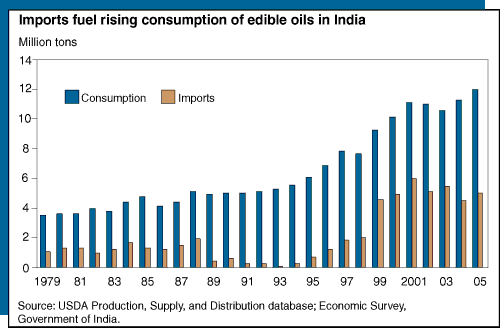India and U.S. Could Gain From Liberalizing Oilseed Trade
- by Suresh Persaud
- 6/1/2006
India has emerged as one of the world’s largest importers of vegetable oils. Imports have grown partly because of sharply reduced vegetable oil tariffs, coupled with rapid economic growth and an expanding middle class. But growth in oil imports is also the result of India’s restrictive trade policies on imports of oilseeds (soybeans, peanuts, rapeseed, and sunflower seed), the critical raw materials from which food processors extract vegetable oils and feed proteins. India’s oilseed production is insufficient to meet demand from domestic oil producers, who are forced to operate at low rates of capacity utilization (30-40 percent). Without a significant increase in the availability of oilseeds, either through greater domestic production or reduced import barriers, India will likely experience a growing deficit in vegetable oils and an eventual deficit in feed protein.
Stakeholders in the Indian market stand to gain if India follows the example of other developing countries—most notably China—and reduces barriers to oilseed imports. Lower tariff and nontariff barriers on oilseeds would stimulate large-scale soybean imports, particularly if oil tariffs are not altered from their current levels. Processors in India could use imported oilseeds to more fully utilize capacity, resulting in lower processing costs and higher net revenues and employment. Moreover, lower processing costs would allow oil producers to better cope with competition from the influx of cheap palm oil imports.
The U.S. could also benefit if India liberalizes its oilseed trade, while keeping in place its tariffs on oils. U.S. exports of soybean oil to India have been limited because Latin American soybean oil and Asian palm oil are cheaper. The U.S. is a competitive soybean supplier, but its soybean exports have been blocked by India’s tariff and nontariff barriers. Although U.S. suppliers of soybeans and products would still face considerable competition from Latin American suppliers, U.S. trade prospects would likely improve if India liberalizes trade and substitutes soybean imports for oil imports.
This article is drawn from:
- Persaud, S. & Landes, M. (2006). The Role of Policy and Industry Structure in India's Oilseed Markets. U.S. Department of Agriculture, Economic Research Service. ERR-17.


